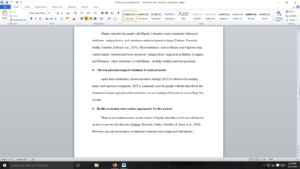The primary diagnosis
| Jill, a 24 y/o Hispanic female arrives in the emergency room where her parents brought her for evaluation. They are worried because she is giving away all of her possessions and says she is planning to move to the South Pole so she can “save the world.” Her parents say that she has hardly been sleeping at all for the last 7 days, but she seems very energetic. They say she has appeared to be “in a frenzy” lately. When you interview Jill you notice that she speaks very rapidly and is laughing uncontrollably. It is hard to get her to be quiet long enough for you to ask questions. She seems agitated and has difficulty sitting still.
|
|
| Questions: | Remember to answer these questions from your textbooks and clinical guidelines to create your evidence-based treatment plan. At all times, explain your answers.
|
Submission Instructions:
- Your initial post should be at least 500 words, formatted, and cited in current APA style with support from at least 2 academic sources.
Requirements: 500 words
Answer preview
Maniac episodes for people with Bipolar I disorder require treatment with mood stabilizers, antipsychotics, and sometimes sedative-hypnotics drugs (Yatham, Kennedy, Parikh, Schaffer, & Bond et al., 2018). Mood stabilizers such as lithium and Valproate help control maniac episodes and level out moods. Antipsychotic drugs such as Haldol, Loxapine, and Thorazine, when used alone or with lithium, can help stabilize and treat psychosis.
- The non-pharmacological treatment I would prescribe
Apart from medication, electroconvulsive therapy (ECT) is effective for treating manic and depressive symptoms. ECT is commonly used for people with the disorder in the treatment of mania episodes when medicines are not working effectively or not working fast enough.
[621 Words]

The primary diagnosis

